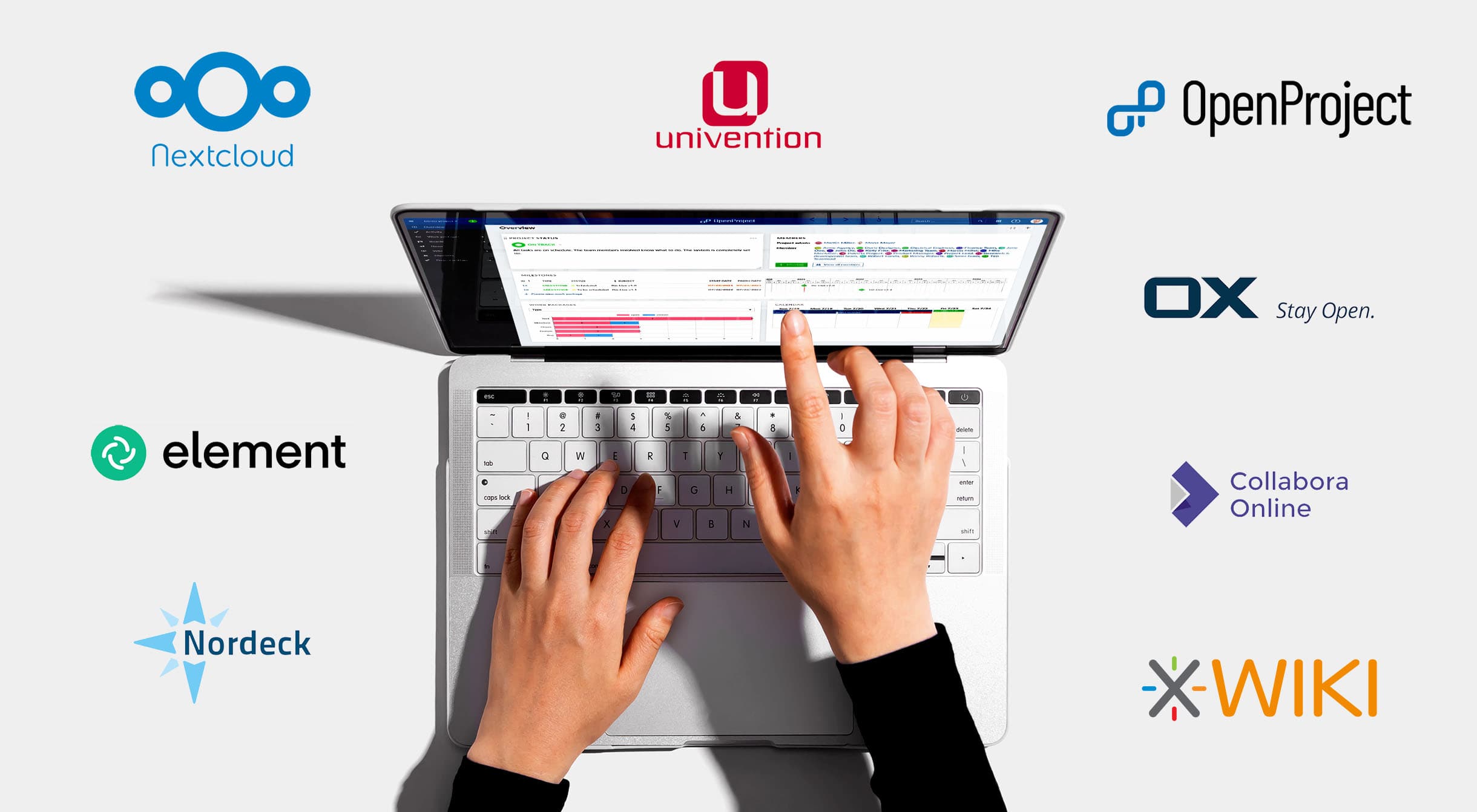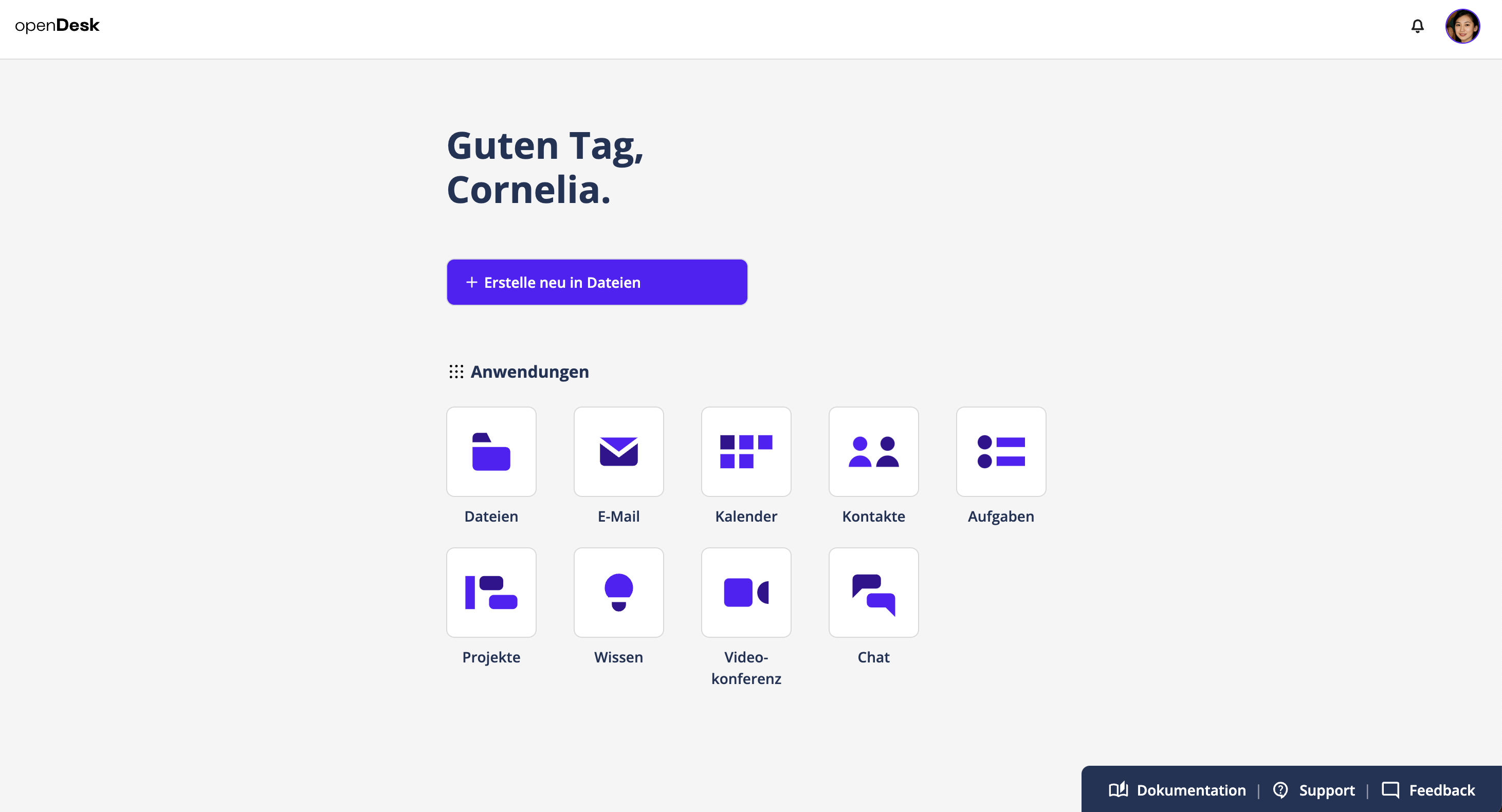
The rise of the Sovereign Workplace: openDesk – Your open source alternative to Microsoft and Google
Important
This article has first been published in August 2023. It has now been updated with new information after the release of openDesk version 1.0.
Data privacy matters – we all know that and still, we send E-Mails with Microsoft and upload files to Google. Free and open source alternatives are sometimes simply not attractive enough in their standalone-version. This is changing right now! A group of open source software vendors are currently collaborating to offer what people are missing: A Sovereign Workplace – an open source alternative to hyperscalers like Microsoft, Google and Co. The project is led by ZenDiS – Centre for Digital Sovereignty.
In September 2023, the initiative of this project has decided on openDesk as a name for the software that comes out of the idea of the Sovereign Workplace.
In October 2024, ZenDiS has presented the first Enterprise version of openDesk at the Smart Country convention. openDesk 1.0 is available on Open coDE. There is also a free Community version available on https://gitlab.opencode.de/bmi/opendesk/info. On the GitLab info page, you can watch an introduction video about openDesk.
Let’s dive into the idea of openDesk – the Sovereign Workplace, and learn how the world will benefit from this important initiative.
Concentrated facts about openDesk - the office and collaboration suite for public administration
What: A digital workplace offering a bundle of powerful open source software
Main target group: The public sector in Europe
Product owner: ZenDiS
Vendors: Collabora, Element, Nextcloud, Nordeck, OpenProject, Open-Xchange, Univention, and XWiki
Service provider: B1 Systems
Cloud platform: STACKIT
When: Release of openDesk 1.0 happened in October 2024, more to come (see roadmap)
Read the article to know why we need an open source and digital Sovereign Workplace, and how it will soon offer you a true alternative and release you from the burden of dependency and vendor lock-ins.
- Why do we need a Sovereign Workplace?
- What is the idea behind a Sovereign Workplace?
- Who is participating in openDesk?
- Impressions of openDesk 1.0
- Next steps: Plans for openDesk
Why do we need a Sovereign Workplace?
Digitization is no longer a dream of the future. It is growing steadily - in some industries and companies faster than in others. The gap between highly digitized and still quite analog organizations is widening. And it’s not just about the high-tech standard of the hardware, but also about the understanding of digital products and software, which have long been part of our everyday lives, both professionally and privately.
Many people and organizations are not yet fully aware of the consequences of sharing data in the cloud and what happens to their data.
Why don’t you answer a few questions, for yourself or your organization: With which tool do you…
- read and write E-Mails?
- video chat with your colleagues or friends?
- upload and share files?
- manage your projects and collaborate with your colleagues?
Probably, you have thought of at least one of the big global players: Google, Microsoft, Apple, Zoom, … – all of those are US companies that have immense power and influence. The circumstance that a few vendors have access to a lot of personal and sensitive data puts us in a strong dependency.
Why do we still use those products, even though our data does not remain under our control and is not in the best hands of external US companies?
There are several answers to that question:
- They are mainly free of charge (although we probably pay with our data)
- They offer a whole bundle of integrated tools (e.g. Microsoft)
- They have powerful features due to strong financial resources
- We don’t really know alternatives
It seems like we don’t really have a choice. Open Source alternatives are often a standalone tool and are barely recognized next to the consortium of big global players. Still, especially in the (European) public sector, we want to do everything we can to get away from our dependence on US-American hyperscalers. To reduce our dependencies, especially on US hyperscalers, and take back control of our data.
Now we have great news for you: An open source consortium with numerous providers is working hard together, under the leadership of the German Federal Ministry of the Interior (BMI) to offer a true alternative to these digital giants - a digital Sovereign Workplace for the public sector!
If you want to get more information on the importance of digital sovereignty, take a look at ZenDiS – a German initiative with the goal to accompany public administration on its way to technological self-determination.
What is the idea behind openDesk?
We’ve talked about the reasons why most of us are still bound to Microsoft, Google and Co. The goal of openDesk is to offer exactly that: A true alternative digital workplace, free in every aspect of the word’s meaning, and with great tools that work even better in combination than alone. And while the project was still in its infancy in recent years, it is now progressing with great strides!
Open source software solutions have gained significant recognition and importance at the European level. The European Commission is actively promoting the adoption of open source software. Open source is a licensing model that grants users the right to view, redistribute and modify the respective components. This makes open source a fundamental characteristic for data independence. In Germany, already 86% of companies with more than 2,000 employees already use open source software solutions (source: cio.bund.de).
Here are three main reasons why you should choose openDesk for public administration:
1. Collaboration: Creating projects, collaborating on documents, wiki, chat, video conferencing and much more – all in one place.
2. Demand-based approach: The software was customized to the specific requirements and needs of digital collaboration in public administration.
3. Sovereignty and security: As open source software, openDesk strengthens digital sovereignty by providing full transparency and control over the source code. Security vulnerabilities are quickly identified and eliminated, and data and processes remain well protected.
The tools vendors for openDesk were selected to cover a range of features that are particularly necessary in the public sector. For example: Word processing and spreadsheets, project management, collaboration and data exchange, communication by mail and short messages.
Who is participating in openDesk?
The starting point for openDesk was Dataport’s Phoenix project, which has already been in place since 2020 but was not able to fulfill the requirements of a true open source alternative since parts of the developments have never been published. Another important player is Open CoDE, the joint open source platform of the public administration. We strongly recommend to take a look at and register at Open CoDE if you are interested in the administration in matter of open source.
Let’s take a closer look at the components of openDesk and the particular open source software vendors, roughly divided into their areas of application:
| Productivity and Collaboration | Communication | Infrastructure |
|---|---|---|
| Nextcloud: File sharing | Element: Messenger | Univention: IT infrastructure |
| OpenProject: Project management | Open-Xchange: E-Mail provider | |
| Collabora Online: Word processing, presentations, and spreadsheet | ||
| XWiki: Wiki platform | ||
| Nordeck: Whiteboards (as widget for Element) |

In 2024, two partners have joined the openDesk initiative: B1 Systems, as a general contractor for openDesk, and the German provider STACKIT, to support the cloud platform for openDesk.
OpenProject’s part in openDesk
Efficient project management and collaboration are an essential factor for the success of work in the public sector. We take this project very seriously and put a lot of work and passion into the development of features for openDesk.
But we are also well aware that one of the main goals of this project is to create an integrated, complete workplace solution. Which is why we started collaborating with Nextcloud, the leading open source vendor for file sharing. Since 2022, OpenProject offers a Nextcloud integration, which is continuously improved by a dedicated team of developers. Further integrations with other components are in planning and will be added as the project progresses.
Impressions of openDesk 1.0
As described above, this article has first been published in August 2023. By now, a first version of openDesk is available. Let’s share some impressions!
Here is an example of a start page in openDesk 1.0, showing options to get to work (in German):

And this is how project management looks like in OpenDesk, features coming from OpenProject:

Next steps: How to get started with openDesk
As openDesk is designed to be operator-independent, in the future, IT service providers shall be able to operate openDesk for its customers.
openDesk is now offered in various operating models:
-
There is a fully-fledged free Community edition with Community-support, that can be self-installed by tech-savvy people. Ideal for experimental and smaller organizations.
-
Also, there is an Enterprise edition of openDesk with three options:
- Self-hosted in your own infrastructure with SLA (Service Level Agreement) and support options, ideal for public IT service providers and security sectors.
- With the all-round carefree package SaaS offering on STACKIT infrastructure and B1 as service provider, ideal for authorities and public organizations that want to get off to a quick start with a high-performance offering.
- In your Confidential Cloud, a secure operation at an international hyperscaler, ideal for authorities and public organizations that operate internationally.
Although the main target group for openDesk is the public sector, other organizations and companies will benefit as well. As for OpenProject, we have already been commissioned some great features through the collaboration with the BMI for openDesk. For example, the PDF of work plans was a feature motivated by openDesk and was released with OpenProject 13.0 in 2023.
The vision of openDesk is to offer a true open source alternative throughout Europe. Even though the project is initiated in Germany, other European governments are not only following the project, but have already expressed partial interest in participating themselves. We are very excited and honored to be a part of this journey.
For more information on openDesk, including a feature overview and a roadmap, visit the official website hosted by ZenDiS: https://opendesk.eu/en/
If you want to stay informed about the technical progress of openDesk, take a look at the project on Open CoDE.


